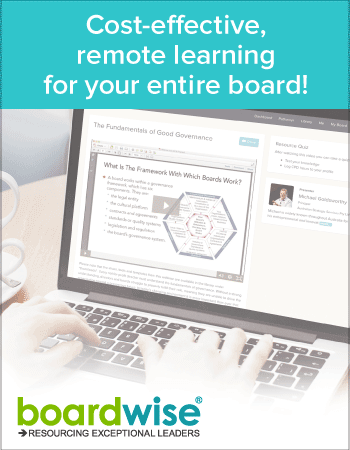governance
Five Fatal Flaws to Avoid in Your Next Board Review
Published: April 8, 2022
Read Time: 5 minutes

Five fatal flaws to avoid in your next board review:
1. A lack of purpose, rather than a lack of talent 1
Ask yourself, why are we doing a board review? If the answer is, we are required to do so under our board charter, then beware, you are missing a great opportunity.
Boards are encouraged to stand back and reflect on where their organisation is on its journey of development and how the board is operating in this context. Board reviews should be built around your organisation’s strategic aims and assist to drive your organisation into the future.
Boards should consider the key objectives they would like to achieve from doing a board review.
The method and extent of a board review should also be decided; it may be by informal conversations with the chair, by workshop, by survey, by interviews (with directors and maybe executives) or a combination of some of these elements.
The chair should ensure the board is fully ‘on board’ with the objectives and the process of an impending board review and encourage each director to embrace the opportunity to enhance board relations and effectiveness.
At no point in a career does an individual move beyond the benefit of feedback, reflection and growth. For directors, a board review offers this personal and organisational opportunity.
2. If you plan to fail…
The scope of the board review also needs to be clear – what’s in and what’s out? You can’t cover everything so it is worthwhile being deliberate with each board review on your key areas of focus.
There is always benefit in a general review of dynamics of the Board, given the critical importance of the board leading culture from the top. But board reviews should not solely be naval gazing and should more broadly analyse the board’s connection and effectiveness in the context of the wider organisation and its mission.
A thematic approach can also be valuable. Some interesting themes I’ve explored with boards in recent times include:
- Purpose and role clarity
NFPs are well advised to regularly check in with their purpose and make sure they haven’t lost sight of why they exist and their key strategic aims.
Taking the opportunity to step back as a board and reflecting on the big picture can be a significant benefit of the pause enabled by a board review.
- Culture
How well does your board understand your organisation?
The business of board meetings can mask a lack of true connection with the wider purpose and wellbeing of your organisation.
So is it time to pause and check in with your organisation in a more holistic manner?
- Reporting
What is not reported to the board is often rarely discussed and a board review provides an opportune time to have a considered conversation on this issue.
Boards should ask themselves do they need to hear more targeted information? Or shake up the agenda or discussions to ensure consideration of new and emerging issues, such as:
- Non-financial risks?
- More focus on risk mitigation?
- More focus on the ‘customer voice’?
- More candour?
3. ‘I’ll go tally the votes’
A board review should generally not turn into an episode of ‘Survivor’. Ensuring each director is ‘on board’ with the process of enhancement means that generally a board review should not aim to ‘kick off’ the perceived weakest link.
Rather, a board review should focus on areas of growth and constructive challenge, not only for individual directors but also regarding board process, culture and function.
Honest feedback should be sought and obtained.
The key then is to deliver that feedback in a constructive manner that will encourage reflection and meaningful change…
4. Breakup or breakdown
Overall board reviews should be constructive and focused on improving the end game; the board’s focus on mission and purpose and its ability to oversee delivery of the organisation’s strategic aims.
A board review should not result in the board being less able to work as a collective than before the review. Boards remain collective decision-making entities, so the process of review should focus on this and ensure enhancement of the collective function as the main aim.
The chair has a natural leadership role in assisting constructive review and may receive support in giving respectful and constructive feedback.
5. Using the same thinking as in the past 2
Is your last board review stored safely tucked away in a drawer somewhere?
Did it see the light of day after your initial read?
It is imperative with any board review for the board to agree on the action items arising and to nominate responsibility for actioning these next steps. This step cannot be missed.
As Henry Ford stated, ‘If everyone is moving forward together, then success takes care of itself’. A well-structured board review offers an opportunity for boards to recalibrate, check in with their organisation’s purpose and strategic aims and ensure everyone is moving forward together. It is an opportunity not to be wasted with a tick-box approach.
This article was first published in the Better Boards Conference magazine, August 2021.
Share this Article
Recommended Reading
Recommended Viewing
Author
-
Consultant & Facilitator
Beth McConnell Consulting
- About
-
Beth McConnell is passionate about improving the way boards and teams work together, providing practical guidance to boards, directors and executive teams to empower them to achieve their organisation’s strategic goals.
Beth provides a range of services to boards, including board reviews, board training, tailored workshops, facilitation and coaching – bridging the gap between theory and practice. Beth focuses on improving the way boards and executive teams work together, to empower them to achieve their organisation’s strategic goals. Beth is an experienced corporate governance adviser having worked in management consulting specialising in governance, leading corporate law firms and in-house with superannuation funds.
Beth has over 25 years’ experience as a solicitor and a consultant specialising in corporate, trust and superannuation law and corporate governance. At the time of writing, Beth sits on the Superannuation Complaints Tribunal, the boards of CatholicCare and Xavier College and as Independent Consultant to the Audit, Risk and Compliance Committee of UniSuper. Beth is also a Panel Member on the Australian Financial Complaints Authority.
Beth has a Bachelor of Commerce, a Bachelor of Laws (Hons) and a Master of Commercial Law from The University of Melbourne. Beth is a Graduate of the Australian Institute of Company Directors and trained at the Institute of Executive Coaching and Leadership.
Found this article useful or informative?
Join 5,000+ not-for-profit & for-purpose directors receiving the latest insights on governance and leadership.
Receive a free e-book on improving your board decisions when you subscribe.
Unsubscribe anytime. We care about your privacy - read our Privacy Policy .










